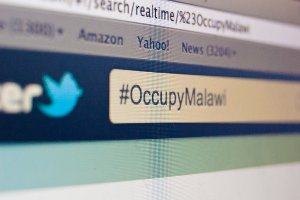
When the people of Egypt filled Tahrir Square, we were predictably glued to the newsroom television. A single screen that normally flickered between British football games and Nigerian soap operas suddenly became fixed on Al Jazeera updates. It was a blazing hot January, and I had just begun reporting at Malawi's oldest newspaper, The Daily Times.
The Arab Spring made an indelible impression on people across the globe. Beginning my internship at the Times, the first questions from family and friends were about a people's revolution happening nearly 5,000 kilometres north. They asked what the mood was like in Africa and if the uprising was spreading south. There were a few moments when I had to earnestly explain that Egypt and Malawi were very different countries.
But that was before the country began sliding into brutal dictatorship. Over a few short months, I began noticing similarities between the disillusioned and increasingly undemocratic states. Since then, the small African nation has launched its own campaign of anti-government protests. Borrowing spirit and courage from Egypt's revolution, Malawians have shown they're also willing to fight for freedom.
"I think in northern Africa -- the so called Arab Spring -- there are some parallels to be drawn," says Rafiq Hajat, founder of a prominent Malawian human rights organization and the country's chapter of Transparency International. "We do have a populace that feels disenfranchised."
Since the beginning of this year, Malawians have seen their ruling government censor media, cut off diplomatic ties, suppress demonstration and generally become unwilling to hear needs and demands from the public. It's a government that uses raised machetes to influence public opinion, and is openly intolerant of dissent.
Social media: 'an elitist luxury'
Here's a quick rundown: In January, new legislation was enacted to allow government to ban private media at its own discretion. In February, a politics professor was detained and interrogated for even suggesting to his public policy class that Egypt and Tunisia had similar fuel and foreign currency shortages before people rebelled. (The university has been closed ever since.) Elections were delayed, human rights advocates were attacked and a British diplomat was deported over a leaked cable that observed Malawi's leadership “continues to deteriorate in terms of media freedom, freedom of speech and minority rights."
Such a steep decline in democracy has sent the donor community running scared. During my stay in Malawi, the International Monetary Fund, European Union, Britain, Germany, Norway, and the United States all pulled out or froze a combined $750 million in aid.
Malawi was already a poor country -- one of the poorest in the world. About 40 per cent of the federal budget relies on bilateral donations. To fill the gap, government began taxing local businesses like the Daily Times. Everyone from journalists, street vendors, taxi drivers and physical labourers felt the pinch of financial meltdown.
"It's like milking an already starving cow," I was once told on the minibus.
On July 20, 2011, thousands of Malawians took to the streets. It was the first set of national demonstrations since the country became a democracy in 1994. In Blantyre, Lilongwe and Mzuzu, citizens wore red to show their solidarity. By the end of the day, police brutality and rioting left 19 people dead and hundreds injured.
Having just arrived back in Canada a few jet-lagged days before the protests, I was constantly checking Twitter and Facebook for updates. I texted my friends and scanned for new headlines every few minutes. There was no #OccupyMalawi hashtag, nor were there breathless Facebook updates from Nicholas Kristof. Save for a handful of expats and journalism colleagues, I found virtually nobody was covering the riots.
Hajat points to an obvious and acute lack of communications infrastructure. "We knew social media would not be such a potent weapon," he says. For Malawians, social media is an elitist luxury -- a tool catering to the country's wealthy diaspora.
"The level of literacy and poverty is very different," Hajat explains. "If you think about it, only six per cent of Malawians have access to electricity -- imagine how many have regular access to computers."
Even for those who can pay for access to the Internet, sound connections are never guaranteed. "The Internet has been very slow and at times it was going off," explains Joyce Tembo,* a Malawian journalist who covered the July uprising.
Malawi's protests didn't pierce international consciousness the way Egypt's riots did. This gave Malawi's government confidence that brutality and arson were fair game.
"This time I'll go after you," President Bingu wa Mutharika threatened at a police graduation ceremony. "Even if you hide in holes, I'll smoke you out."
The revolution will not be tweeted
And smoke out his critics he did. Hajat is just one victim of several firebombings linked to Bingu's Democratic Progressive Party.
But even with his life and livelihood in danger, Hajat refuses to go into hiding. Along with leaders from other human rights organizations, he began planning the next set of nation-wide demonstrations.
"Initially we had presented a petition to the president," says Hajat. "We actually outlined the governance, economic, social and political issues. We had given him a deadline to address this, but he has not done so yet."
Subsequent protests and peacemaking efforts have been undermined by intimidation and rampant misinformation. "Enough is enough," the president shouted during an emotional speech in late August. "If my opponents want war, so be it. I will take them head-on. Let the country go on fire."
International media have picked up on the story, but on the ground, rumours are circulating. "We're using word of mouth, we're using the radio media such as Zodiac to get our messages out," says Hajat, adding that Malawians are now confused about the intentions of non-governmental organizations (NGOs), too. "It's a process of understanding."
On Sept. 21, a day that was initially reserved for demonstration, NGOs asked Malawians to stay home. "It's been quiet," says Tembo on the day of the anticipated protest -- called "vigils" in remembrance of those who were killed in July. "A lot of shops are not open, there's a heavy police presence."
Hajat says followup demonstrations were "called off due to the lack of security and pressure from the police."
Tembo says the government has been using the lack of certainty to stave off dissent. "I didn't see it because I was in my house, but last night a truck with a loudspeaker passed by telling people the Sept. 21 vigils were called off," she recalls. "They said, 'No vigils. Don't stay home. Go to work and send your children to school.' "
"I believe those people are from the Ministry of Information," Tembo adds.
Without access to accountable information, the public is not sure who to believe. "Some people feared to go to work," Tembo says. "The people stayed home not because of the vigil but because they're scared, or not quite sure what will happen."
Without a hashtag, Malawians have little hope of reaching international awareness. "Greater communication would hold our government accountable in a way that would have been impossible just a few years ago," says Hajat. "Yes, I think with greater access to social media we certainly would see a marked change."
"We've got a long way to go before we can truly have a system whereby people can voice their concerns without fearing the system," he concludes.
*Name has been changed to protect identity.
Find more Rights + Justice stories on The Tyee. ![]()















Tyee Commenting Guidelines
Comments that violate guidelines risk being deleted, and violations may result in a temporary or permanent user ban. Maintain the spirit of good conversation to stay in the discussion.
*Please note The Tyee is not a forum for spreading misinformation about COVID-19, denying its existence or minimizing its risk to public health.
Do:
Do not: